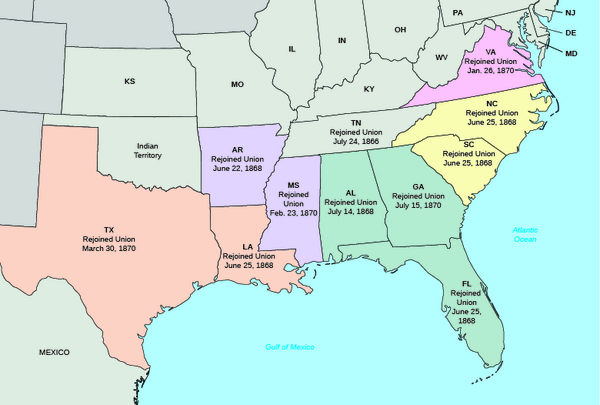| << Chapter < Page | Chapter >> Page > |

President Johnson’s relentless vetoing of congressional measures created a deep rift in Washington, DC, and neither he nor Congress would back down. Johnson’s prickly personality proved to be a liability, and many people found him grating. Moreover, he firmly believed in white supremacy, declaring in his 1868 State of the Union address, “The attempt to place the white population under the domination of persons of color in the South has impaired, if not destroyed, the kindly relations that had previously existed between them; and mutual distrust has engendered a feeling of animosity which leading in some instances to collision and bloodshed, has prevented that cooperation between the two races so essential to the success of industrial enterprise in the southern states.” The president’s racism put him even further at odds with those in Congress who wanted to create full equality between blacks and whites.
The Republican majority in Congress by now despised the president, and they wanted to prevent him from interfering in congressional Reconstruction. To that end, Radical Republicans passed two laws of dubious constitutionality. The Command of the Army Act prohibited the president from issuing military orders except through the commanding general of the army, who could not be relieved or reassigned without the consent of the Senate. The Tenure of Office Act, which Congress passed in 1867, required the president to gain the approval of the Senate whenever he appointed or removed officials. Congress had passed this act to ensure that Republicans who favored Radical Reconstruction would not be barred or stripped of their jobs. In August 1867, President Johnson removed Secretary of War Edwin M. Stanton, who had aligned himself with the Radical Republicans, without gaining Senate approval. He replaced Stanton with Ulysses S. Grant, but Grant resigned and sided with the Republicans against the president. Many Radical Republicans welcomed this blunder by the president as it allowed them to take action to remove Johnson from office, arguing that Johnson had openly violated the Tenure of Office Act. The House of Representatives quickly drafted a resolution to impeach him, a first in American history.
In impeachment proceedings, the House of Representatives serves as the prosecution and the Senate acts as judge, deciding whether the president should be removed from office ( [link] ). The House brought eleven counts against Johnson, all alleging his encroachment on the powers of Congress. In the Senate, Johnson barely survived. Seven Republicans joined the Democrats and independents to support acquittal; the final vote was 35 to 19, one vote short of the required two-thirds majority. The Radicals then dropped the impeachment effort, but the events had effectively silenced President Johnson, and Radical Republicans continued with their plan to reconstruct the South.

Notification Switch
Would you like to follow the 'U.s. history' conversation and receive update notifications?